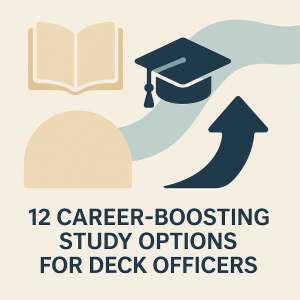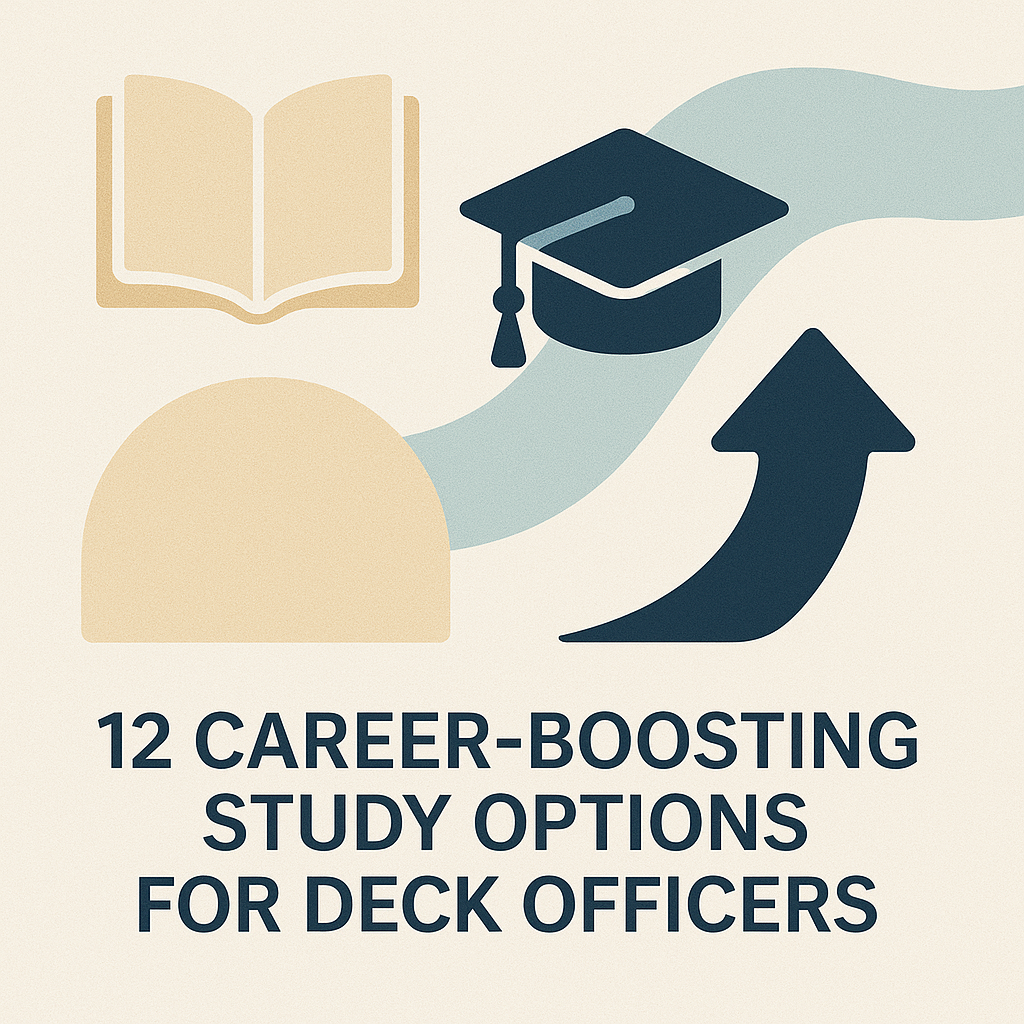Explore 12 advanced study options for deck officers to enhance their careers—from maritime leadership programs to autonomous shipping certifications. Discover how continuous learning can open doors to higher ranks, shore-based roles, and future-proof skills.
Why Further Studies Matter for Deck Officers
 Imagine two deck officers with identical experience:
Imagine two deck officers with identical experience:
-
Officer A sticks to mandatory certifications.
-
Officer B pursues advanced training in voyage optimization and maritime cybersecurity.
Five years later, Officer B is a Marine Superintendent earning 40% more, while Officer A remains a Chief Mate.
This isn’t luck—it’s strategy.
The maritime industry is evolving rapidly. Autonomous ships, green shipping regulations, and digital navigation tools are reshaping careers. For deck officers, staying competitive means going beyond the STCW basics. Whether you aim for captaincy, shore-based management, or specialized roles, further education is your compass to success.
In this guide, we’ll explore 12 high-value study options for deck officers, including:
- Advanced certifications (Dynamic Positioning, LNG Handling)
- Degrees (Maritime Law, Naval Architecture)
- Leadership programs (MITAGS, Lloyd’s Maritime Academy)
- Future-focused skills (Remote Ship Operations, AI in Navigation)
Let’s set sail into your career’s next chapter.
–
1. Maritime Leadership & Management Programs
Best for: Officers targeting captaincy, superintendents, or shoreside management.
Leadership isn’t just about giving orders—it’s about crisis management, crew motivation, and operational efficiency. Programs like:
-
MITAGS Leadership Courses (USA)
-
Lloyd’s Maritime Academy Management Programs (UK)
-
BZ Maritime Leadership Training (Global)
…teach decision-making under pressure, conflict resolution, and strategic planning. These skills are critical for Chief Officers transitioning to Masters or moving into port captaincy roles.
Real-world impact: A study found vessels with leadership-trained officers had 30% fewer accidents and higher crew retention rates.
2. Dynamic Positioning (DP) Certification
Best for: Officers eyeing offshore oil/gas, wind farm vessels, or research ships.
Dynamic Positioning Systems (DPS) use thrusters and GPS to hold a ship stationary in deep water—a must for drilling rigs and cable-laying vessels. The Nautical Institute’s DP certification is the gold standard, with three levels:
-
DP Operator (Basic)
-
DP Supervisor (Advanced)
-
DP Maintenance
Career boost: DP-certified officers earn 20–30% higher salaries due to high demand in offshore sectors.
3. LNG & Hazardous Cargo Handling
Best for: Officers transitioning to tankers, LNG carriers, or chemical ships.
With global LNG trade growing 6% annually, specialists in liquefied gas handling are in demand. Courses cover:
-
Cargo thermodynamics
-
Safety protocols (IGC Code)
-
Emergency response for leaks/spills
Companies like Shell and Chevron prioritize officers with this certification for their LNG fleets.
4. Maritime Law & Insurance (LL.M.)
Best for: Officers moving into shoreside roles in arbitration, P&I clubs, or regulatory compliance.
An LL.M. in Maritime Law (e.g., from Swansea University or IMO’s International Maritime Law Institute) teaches:
-
Charter party disputes
-
Environmental liability (MARPOL)
-
Marine insurance claims
Career path: Graduates often join law firms, shipping companies’ legal teams, or classification societies.
5. Naval Architecture & Marine Engineering
Best for: Technically inclined officers interested in ship design, stability, or fleet management.
A B.Sc. or M.Sc. in Naval Architecture (e.g., from University of Michigan or TU Delft) covers:
-
Hydrodynamics
-
Structural analysis
-
Green ship design (ammonia/hydrogen fuels)
Opportunity: With 50% of global fleets needing retrofits for decarbonization, naval architects are critical.
6. Autonomous & Remote Ship Operations
Best for: Future-proofing careers as Remote Operators (ROs) for autonomous vessels.
By 2030, 15% of short-sea shipping could be autonomous. Training includes:
-
Remote Monitoring Systems
-
AI-Assisted Navigation
-
Regulatory Frameworks (IMO MSC.1-Circ.1604)
Key insight: Ex-seafarers are preferred for RO roles due to their onboard experience15.
7. Voyage Optimization & Data Analytics
Best for: Officers targeting commercial shipping (brokerage, fleet operations).
Courses like DNV’s ECO Insight teach:
-
Fuel-saving route planning
-
Emission tracking (CII, EEXI)
-
Big data in shipping
Impact: Optimizers can cut fuel costs by 12%, making them invaluable to shipowners.
8. Marine Surveying (Classification Societies)
Best for: Officers seeking shore-based roles with DNV, ABS, or Lloyd’s Register.
Surveyors inspect ships for safety, compliance, and damage. Certifications include:
-
ISM Code Auditing
-
Hull & Machinery Surveys
-
Cargo Surveying
Career path: Many Chief Officers transition to vetting surveyors after certification.
9. Maritime Cybersecurity
Best for: Officers on digitized vessels (ECDIS, AIS-heavy fleets).
With cyberattacks on ships rising 400% since 2020, courses cover:
-
GPS spoofing prevention
-
ISPS Code compliance
-
Network hardening
Example: Maersk’s NotPetya attack cost $300M—highlighting the need for cyber-trained officers.
10. Environmental & Sustainability Management
Best for: Officers aiming for green shipping roles (ESG, carbon trading).
Programs like WMU’s Maritime Energy Management teach:
-
Carbon credit systems
-
Scrubber/Wind-assist tech
-
IMO 2050 Net-Zero Strategy
Trend: EU ETS fees will add $1,500/day to shipping costs—making sustainability experts vital.
11. Simulator Instructor Certification
Best for: Passionate officers who enjoy teaching next-gen mariners.
Approved IMO Model Course 6.09 training qualifies you to teach:
-
Bridge Resource Management (BRM)
-
ECDIS/Radar simulation
-
Emergency scenario drills
Perk: Simulator trainers often work flexible hours at maritime academies.
12. MBA in Shipping & Logistics
Best for: Officers transitioning to executive roles (CEO, Operations Manager).
An MBA from maritime universities (e.g., Copenhagen Business School) covers:
-
Supply chain economics
-
Port management
-
Digital transformation (blockchain, AI)
Success story: A Maersk executive credited her MBA for moving from Chief Officer to VP of Operations.
–
FAQ: Answering Deck Officers’ Top Questions
1. Which certification offers the highest salary boost?
-
Dynamic Positioning (DP) and LNG Handling lead with 30%+ salary increases.
2. Can I study online while sailing?
-
Yes! Lloyd’s Maritime Academy and MITAGS offer hybrid programs for seafarers.
3. Will autonomous ships make deck officers obsolete?
-
No—Remote Operators (ROs) will need experienced officers to oversee autonomous fleets15.
4. What’s the fastest way to move ashore?
-
Marine Surveying or Maritime Law certifications offer quick transitions.
5. Are scholarships available?
-
IMO’s WMU and ITF Seafarers’ Trust offer funding for advanced studies.
–
Conclusion: Charting Your Course
The maritime industry rewards lifelong learners. Whether you choose specialized certifications, leadership training, or future-tech skills, each study option is a stepping stone to higher ranks, shoreside roles, or niche expertise.
Next steps:
-
Identify your goal (Captaincy? Shore jobs? Tech roles?).
-
Pick 1–2 programs from this list.
-
Leverage employer sponsorships—many companies fund upskilling.
The sea of opportunity is vast. Which path will you navigate?
–

